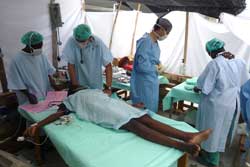Cuba has remained under attack by the USA, states Ashaki Binta
- Submitted by: admin
- Culture and Traditions
- Havana
- history
- History
- international
- personalities
- Science and Technology
- Society
- United States
- Health and Medicine
- Personalities
- Politics and Government
- 03 / 14 / 2010

Unlike medical teams from other countries working in Haiti since the earthquake, Cuban doctors – already 500 strong in Haiti when the quake hit – are winning high praise from the people for doing everything possible to avoid amputations.
Gangrene had already set in to the arm of this woman who was injured in a building collapse and had been unable to find medical help.
These doctors, working in a makeshift outdoor clinic, found a way to save her arm. Despite President Obama’s declaration of his administration’s desire to “seek a new beginning with Cuba” and to “learn from history, not be trapped by it” in April of last year, Cuba has remained under attack by the U.S.
In January, new U.S. air security policies included Cuba on a list of countries whose air passengers would get extra security screening as they enter U.S. territory. And Cuba remains on the State Department’s list of “state sponsors of terrorism,” notwithstanding the lack of any evidence of Cuban involvement in acts of terrorism. Cuba has vigorously protested all of these unconscionable attacks.
In fact, Cuba’s policies of internationalism have arguably been the most politically advanced in the world – from the direct military intervention to help in the defeat of Apartheid in southern Africa in 1988 (Cuito Cuanavale, Angola) to direct medical aid and solidarity with Haiti (before the earthquake). Since the earthquake, Western media has been suspiciously silent on the exceptional role Cuba has played in support of Haiti with more than 900 health care providers on the ground, the largest and most organized contingent on the island.
Yet, one of the most disturbing new attacks against Cuba occurred late year when a host of prominent African Americans signed on to a so-called “Declaration of African American Support for the Civil Rights Struggle in Cuba.”
This misguided declaration accuses the Cuban state of racism. It cites the imprisonment of a Dr. Darsi Ferrer, an active critic of the Cuban government, as an example of racism in Cuba. Dr. Ferrer was reportedly accused of attempting to establish a private medical clinic outside of Cuba’s world-renowned medical system, by receiving illegally obtained construction materials.
Whatever the case, Dr. Ferrer’s situation should immediately bring to mind the 50 year history of attempts by the U.S. to subvert the Cuban Revolution through internal dissent and direct attack harkening back to the Bay of Pigs invasion and so on.
Certainly the struggle against racism anywhere in the world is of paramount importance to all of humanity. But can this attack against Cuba under the guise of fighting racism really be justified? We think not.
Many African Americans may not know about some of the unique features of Cuban history even though African Americans and Cubans have a deeply rooted history of solidarity with each other.
For example, during Cuba’s first War for Independence from Spain in 1868, plantation and slave owner Carlos Manual de Cespedes freed and armed the slaves on his plantation and called on them to join the struggle for Cuba’s independence.
Afro-Cuban Gen. Antoneo Maceo emerged as one of Cuba’s most renowned revolutionary leaders of all time. As a result of this struggle, slavery was abolished in Cuba by 1886.
What a contrast to U.S. history, where the maintenance of slavery was a pre-condition of unity between the colonies in the American fight for independence from Britain. Although more than 5,000 Blacks fought in the American Revolution, legalized slavery continued for nearly another 100 years.
And the U.S. has historically played a role in maintaining racism in Cuba. The U.S. intervention and occupation of Cuba starting in 1898 during Cuba’s second War for Independence (1895), where more than half the fighters were Black, re-established institutional racism in Cuba. Under the intermittent U.S. occupations there, Afro-Cubans and women, as well as the poor, were barred from voting, holding elective office, owning businesses, land etc. Sound familiar?
Most Cuban historians and scholars agree that the Cuban Socialist Revolution in 1959 abolished legalized institutional racism in Cuba.
Cuba’s revolutionary constitution outlawed racial discrimination while open and public debate and education since the revolution have tackled Cuba’s history as an Afro-Cuban nation.
However, the legacy of 500 years of slavery, racism and all forms of discrimination is difficult to completely eradicate in just 50 years, especially while also under the U.S. led attacks and blockade against Cuba.
Even so, the conditions of all Cubans have improved under the covenant of the socialist revolution in Cuba, which has provided free education, free health care, land for poor farmers, reduced cost rent and utilities, the elimination of unemployment and so on.
Racism, institutionalized or otherwise, has not been abolished any place in the world. Yet Cuba, in our view, remains a hopeful beacon in the Western Hemisphere that humane societies can be constructed that provide the basis for the elimination of all forms of discrimination, exploitation and oppression.
You may contact the working group at [email protected].
Documents from the Cuba Working Group may be viewed at
www.blackeducator.org/cubasolidarity.htm.
by Ashaki Binta for the Cuban Working Group of the Black Left Unity Network
Source: www.sfbayview.com/
Comments